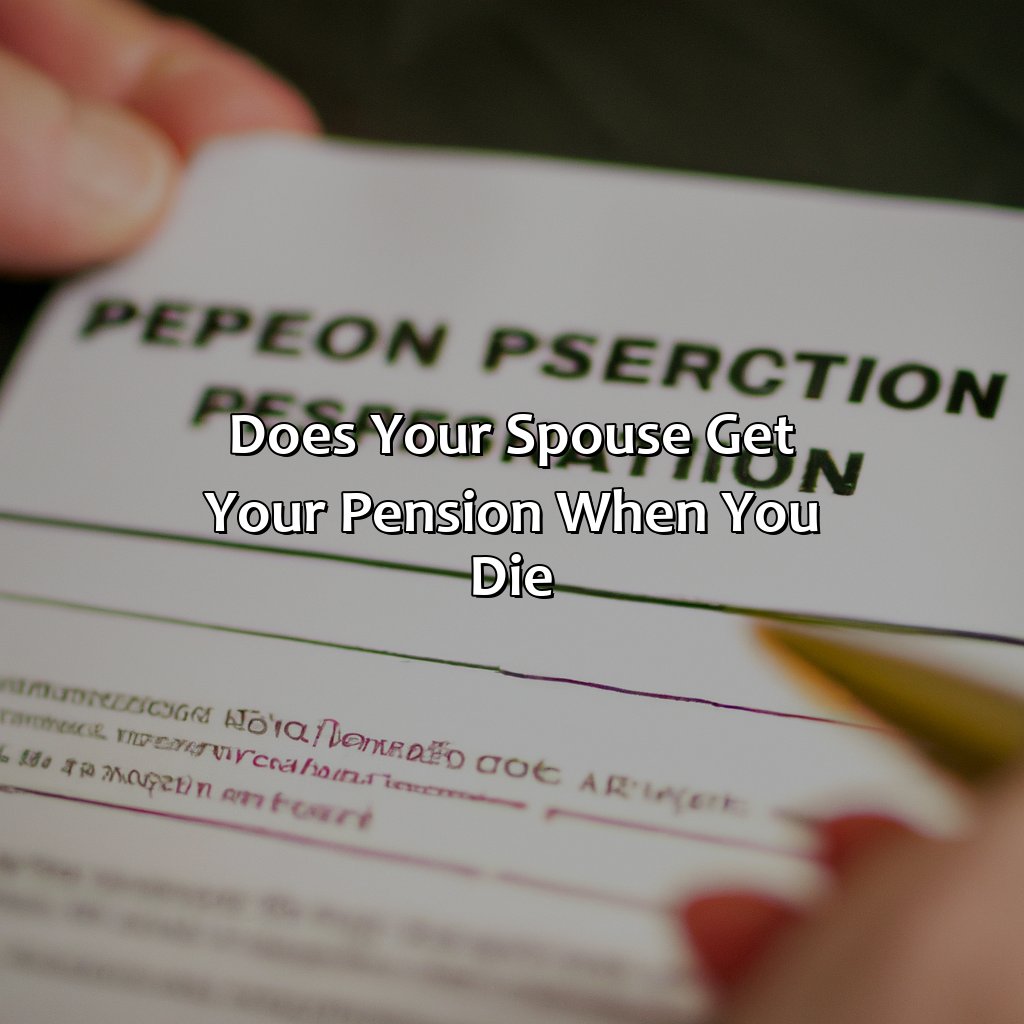Does Your Spouse Get Your Pension When You Die?
Key Takeaway:
- Check your pension beneficiary designation regularly: It s important to review your pension beneficiary designation periodically and update it as needed to ensure that your wishes are implemented and reflected accurately. This is particularly crucial after major life events, such as divorce or marriage.
- Spousal benefits may be available: Depending on the type of pension plan, your spouse may be entitled to receive some or all of your pension benefits upon your death. This can provide financial security to your surviving spouse, but may also require careful consideration of tax implications and other factors.
- Understand the rules of your pension plan: Different types of pension plans may have different rules regarding beneficiary designations, vesting requirements, and tax implications. It s essential to familiarize yourself with these rules to ensure that you are making informed decisions about your pension benefits and beneficiary designations.
Struggling with confusing pension rules? You’re not alone. Knowing what happens to your pension when you die is a key but overlooked concern. Learn who gets your pension money and why it matters.
Pension Beneficiary Designation
Having a designated beneficiary is crucial for pension plans. This ensures that a person you choose will receive your pension benefits after your death.
When designating a beneficiary, you must ensure that the information is current and accurate. Keep in mind that changes such as divorce or remarriage may impact your beneficiary designation. It is advisable to review and update your beneficiary information regularly. Learn how to keep your pension in a divorce to prevent any legal disputes in the future.
It’s important to note that not all pension plans have the same rules for beneficiary designations. Some plans automatically pay the pension benefits to the spouse, while others require written consent or formal documentation. Make sure to understand the rules of your pension plan and follow the necessary steps to ensure your chosen beneficiary receives the benefit.
Sara lost her husband and discovered that his pension benefits went to his ex-wife, whom he had forgotten to remove as the beneficiary. She learned the hard way that keeping beneficiary information updated is crucial. Ensure your loved ones are taken care of by reviewing your beneficiary designation regularly.
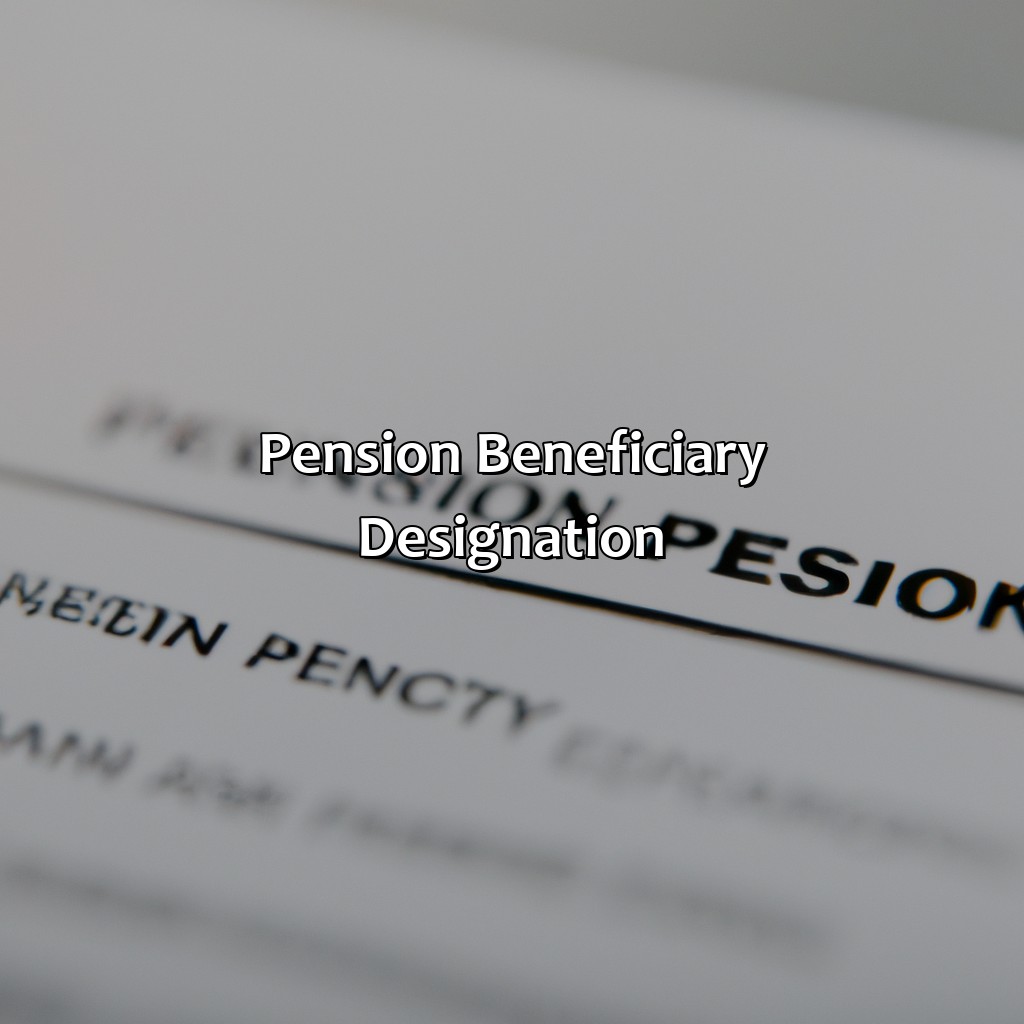
Image credits: retiregenz.com by Yuval Woodhock
Spousal Benefits
Spousal Entitlements: Discover what benefits are available to your spouse in your absence.
The following are some spousal entitlements that may be available to your spouse:
- Spousal Pensions: Spouses are entitled to receive pension benefits upon the account holder’s death.
- Survivor Benefits: The pension plan may offer survivor benefits to spouses as part of the pension agreement.
- Joint-and-Survivor Option: Couples who select this option receive reduced pensions, but the surviving spouse receives the same pension amount after the account holder’s death.
- Retiree Benefits: Spouses may have access to a portion of the retiree’s life insurance policy after their death.
- Social Security Benefits: Spouses are eligible to receive a portion of their deceased spouse’s social security benefits.
- Medical Benefits: Spouses of retirees may be eligible to continue receiving healthcare benefits after the retiree’s death.
It is important to understand the specific details and requirements of your pension plan to ensure your spouse is entitled to the maximum benefits. Some plans may require formal documentation to be completed in advance, while others may automatically provide benefits to surviving spouses. It is also worth considering the impact of taxes and estate planning on spousal entitlements.
A widow shared her experience of receiving spousal pension benefits after her husband’s death. She revealed that without her husband’s meticulous planning, including the selection of a joint-and-survivor option, she may not have received any benefits at all. This highlights the importance of considering spousal entitlements when selecting pension options.
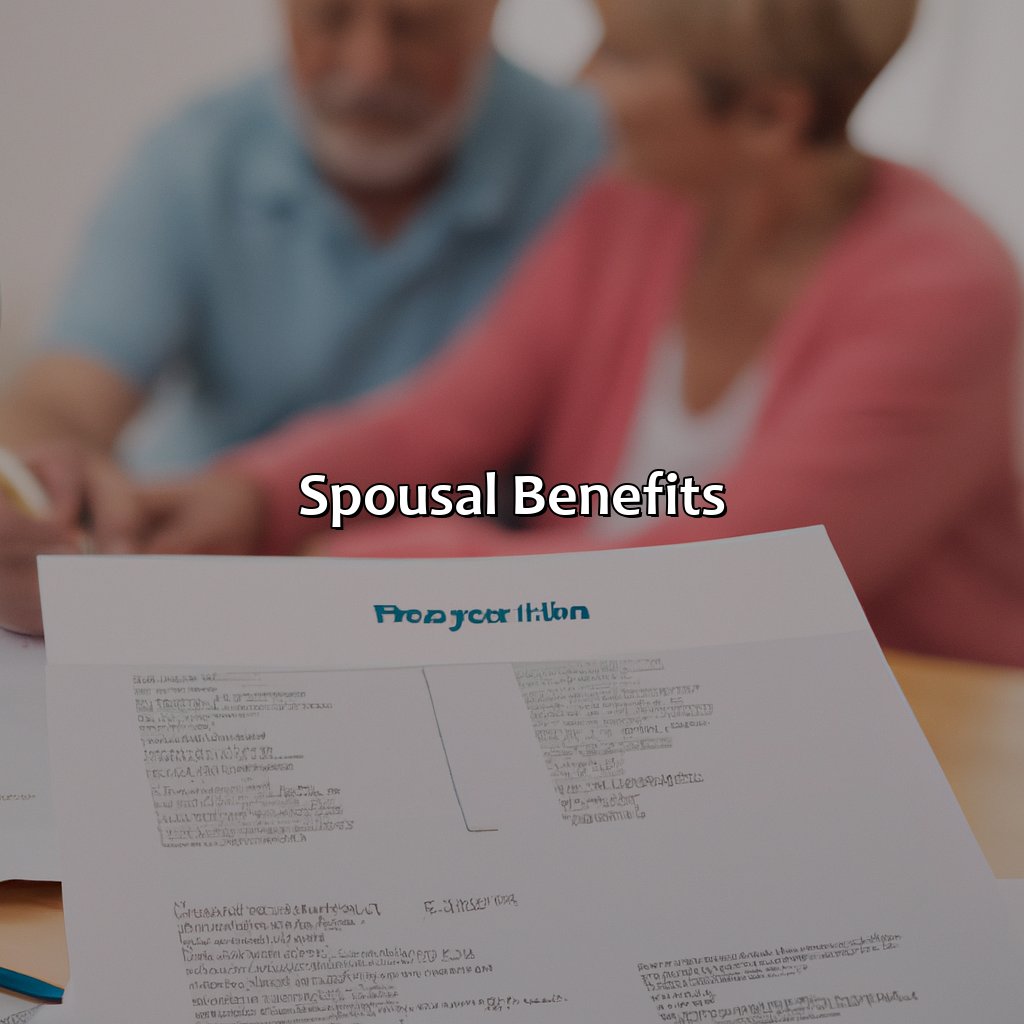
Image credits: retiregenz.com by David Washington
Pension Plan Rules
For your retirement savings, glance at the ‘Pension Plan Rules’.
Pay attention to:
- Types of Pension Plans
- Vesting
- Tax Implications
This way you will be ready for anything. This knowledge will give you a clear picture of how your retirement income is set up.
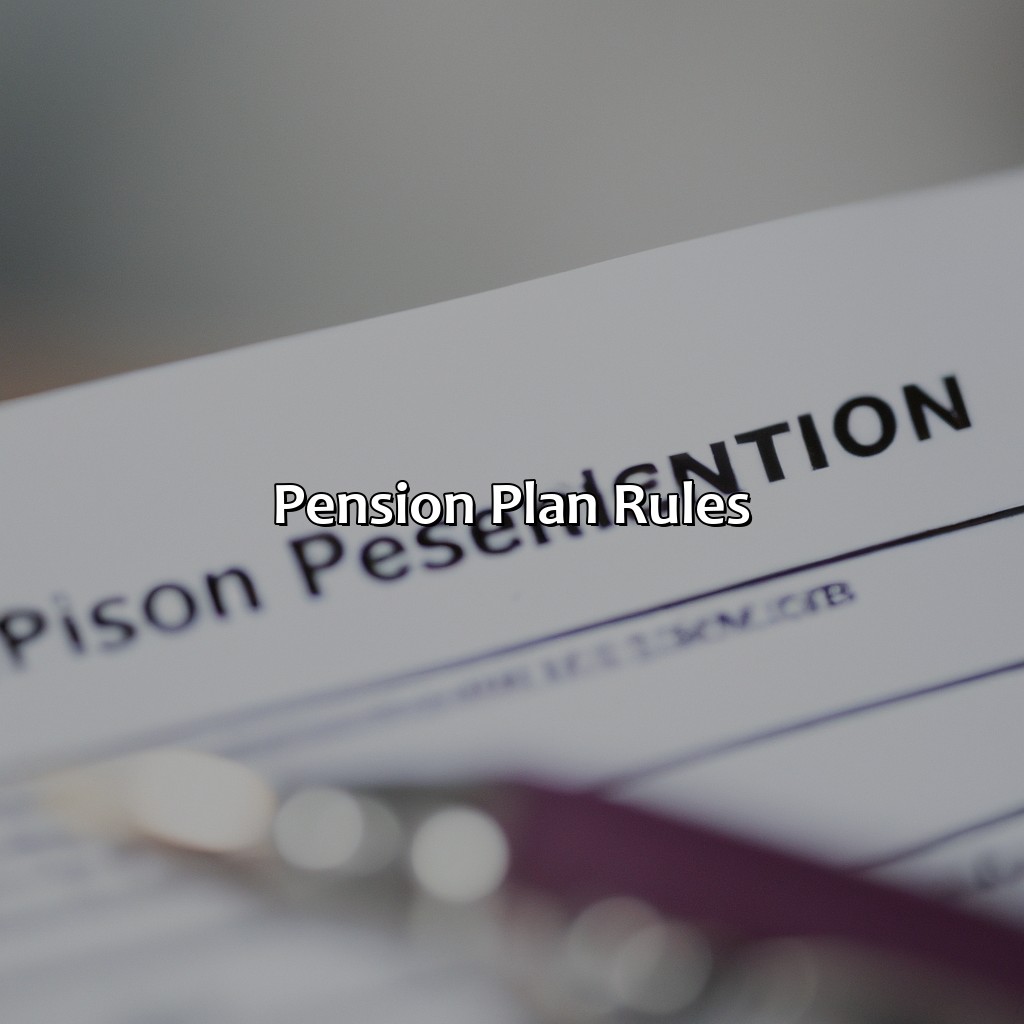
Image credits: retiregenz.com by James Jones
Types of Pension Plans
Pension Plans and What You Need to Know
Various types of employee pension plans can help secure your financial future. Here’s a breakdown of the different types:
| Plan Type | Description |
|---|---|
| Defined benefit plans | This plan guarantees a specific payment amount at retirement age. |
| Defined contribution plans | The employer contributes to this plan, where the payout will depend on how much is contributed and investment returns. |
| Cash balance plans | Combination of both defined benefit and contribution. (Eg. Company sets aside a certain percentage for employees, but invests it like a defined contribution plan) |
Now that you understand the basics, consider additional details such as vesting periods and eligibility requirements in order to maximize your benefits potential.
Don’t miss out on securing your financial future – learn more about how much the state pension is for a married couple today!
Vesting is like a marriage – you won’t get the full benefits unless you stick around for a while.
vesting
When it comes to pension plans, vesting determines when an employee has earned the right to their benefits. This is determined by the employer’s plan rules and may take into consideration factors such as years of service or age. Once an employee is vested, they have a non-forfeitable right to their pension benefits.
It s important to note that even if an employee dies before retirement, their spouse or other designated beneficiaries may still be entitled to receive a portion of their pension benefits. This is another reason why understanding the vesting rules of your pension plan is crucial. You can learn more about widows pension and how long it lasts by clicking here.
It’s also worth mentioning that there are different types of vesting schedules – graded, cliff, and immediate – which can impact when an employee becomes fully vested in their pension benefits. It’s essential to review and understand all the details of your pension plan carefully. If you’re wondering how many years you have to work to get a pension, it’s best to consult with a financial advisor and review the specific requirements of your pension plan.
One example is when John reached his retirement age, he found out that he was not fully vested in his company’s defined benefit pension plan because he had not met the required years of service. As a result, his monthly income during retirement was impacted significantly.
Overall, understanding vesting rules and how they affect your pension benefits should be a top priority for anyone participating in a company-sponsored retirement plan.
I guess death and taxes really do go hand in hand, especially when it comes to pension plans.
Tax Implications
When it comes to the tax implications of pension plans, it is essential to consider how they affect beneficiaries. Upon death, the beneficiary may be subject to income taxes on the pension benefit received. Additionally, if there are outstanding loans on a pension plan, the beneficiary could be responsible for repaying them.
Furthermore, if the beneficiary is a surviving spouse, they may have the option to rollover the pension balance into their own retirement account. This allows for continued tax-deferred growth and postpones any taxes owed until withdrawals are made.
It is crucial to note that non-spouse beneficiaries do not have this option and must take distributions immediately or face penalties and taxes.
Overall, understanding the tax implications of pension plans can help maximize retirement savings and ensure that loved ones receive their rightful benefits. If you’re wondering how long do you have to be married to receive spouse’s pension?, it’s important to check with your specific pension plan as requirements may vary.
Choose your beneficiaries wisely, or your ex could end up with your money and your new spouse could end up with your curse words.
Alternative Beneficiary Designations
Alternative Designated Recipients of Pension Benefits
When it comes to designating who receives your pension benefits upon your death, there are options beyond your spouse. Understanding alternative beneficiary designations is critical to ensuring that your pension benefits are distributed according to your wishes.
- Designate a Child or Other Family Member: In certain circumstances, you may want to designate a child or other family member as the recipient of your pension benefits. This may be appropriate if you are divorced, have a strained relationship with your spouse, or want to provide for a specific family member.
- Designate a Trust: A trust can be an effective way to protect and distribute your pension benefits according to your wishes. By creating a trust, you can avoid the complications of probate and ensure that your beneficiaries receive the funds in a timely and organized manner.
- Designate a Charity or Non-Profit Organization: If you have a passion for a particular cause or organization, you can designate them as the recipient of your pension benefits. This is a great option for those who want to leave a lasting legacy and ensure that their funds go towards a worthy cause.
It is essential to understand the unique details of your pension plan and the rules surrounding alternative beneficiary designations. Consult with a financial advisor or attorney to ensure that your pension benefits are distributed according to your wishes. Also, know how many years it takes to receive full state pension to make necessary arrangements for retirement.
A True History:
In 2017, a man in Florida passed away, leaving behind his pension benefits. Although he was married at the time of his death, he had previously designated his sister as the beneficiary of his pension. His spouse battled his sister in court, arguing that she was entitled to the benefits as his surviving spouse. Ultimately, the court ruled in favor of the sister, highlighting the importance of properly designating your pension beneficiaries.

Image credits: retiregenz.com by Harry Washington
Updating Pension Beneficiary Designation
In the world of pensions, it’s essential to keep your beneficiary designations up-to-date. Ensuring that your pension beneficiaries receive your funds as intended is crucial. To make updates, it’s necessary to navigate the sometimes complex web of pension regulations.
When considering updating a pension beneficiary designation, it’s crucial to understand the process fully. Beneficiary designations supersede wills and other legal documents, so it’s important to get them right. Using the correct forms is crucial, as is making sure that all information is accurate and current.
Additionally, pensions can have specific rules and regulations regarding beneficiaries that vary by plan and jurisdiction. Sometimes, a spouse is automatically the beneficiary unless they waive that right in writing. Understanding the rules specific to your situation is crucial. If you are wondering when you can collect your ex husband’s pension, it is important to research the specific rules and regulations for your particular plan.
In a recent case, a man neglected to update his beneficiary designation after he and his wife divorced. Despite the man’s wishes that his funds go elsewhere, his ex-wife received the pension benefits because she was still listed as the beneficiary. This story illustrates the importance of staying vigilant in updating one’s pension beneficiary designations.
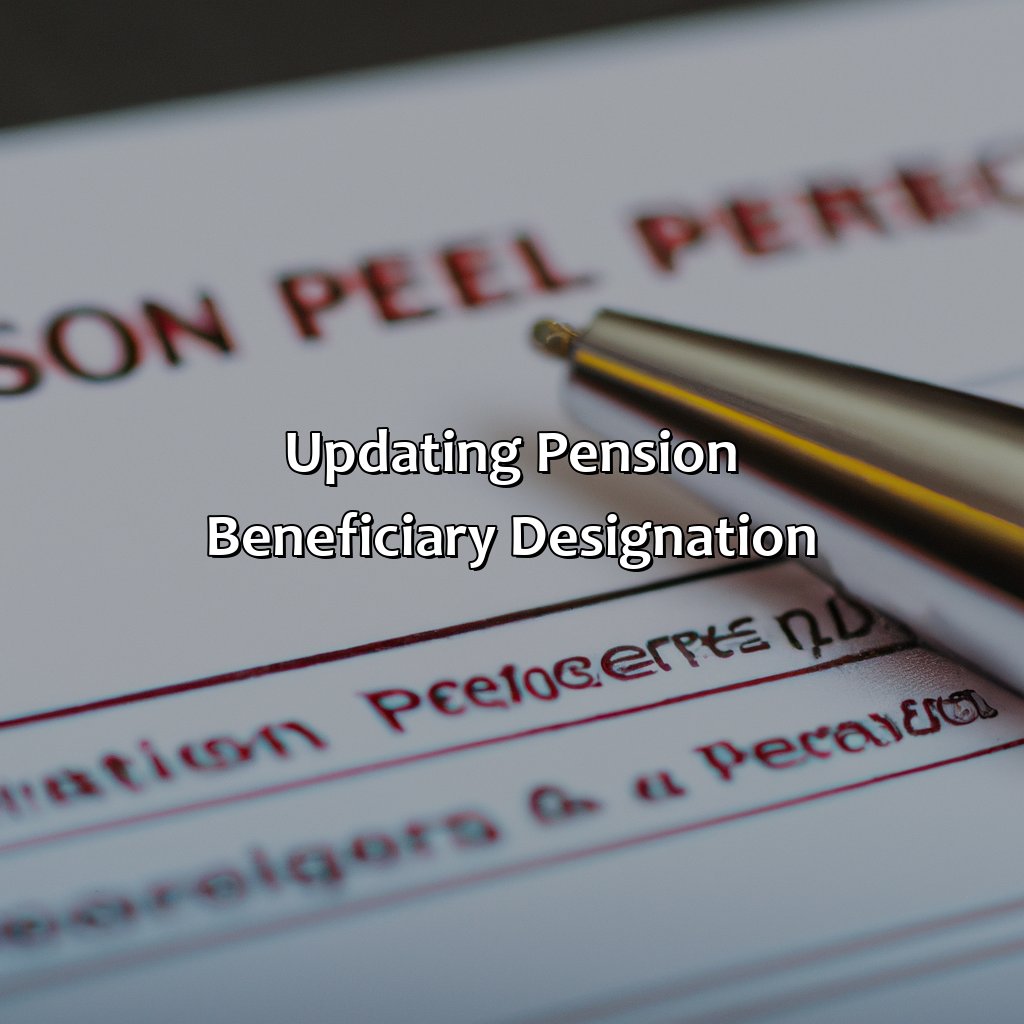
Image credits: retiregenz.com by James Washington
Seeking Professional Assistance.
Professional Support for Pension Planning
As you navigate the complex world of pension planning, seeking expert guidance can offer valuable insights for maximizing benefits. Professional support can assist in identifying investment options, outlining distribution strategies, and building contingency plans for emergencies. These advisors can evaluate your unique financial goals and help determine the most effective approaches to secure your pension’s future. If you are going through a divorce, you may have questions about what happens to your pension. It’s important to understand your rights and options, and a financial advisor can help guide you through this process.
With this guidance, you can be confident that you are taking steps to safeguard your loved ones and avoid potential pitfalls of mismanaging your pension distribution. Expert advisors can provide customizable options to suit your specific needs, including strategies for ensuring your beneficiaries receive the maximum possible benefits after divorce.
Incorporating professional assistance into your pension planning strategy can provide enhanced peace of mind and reassure you that you are making informed choices that align with your financial goals. Don t wait to take advantage of these benefits and give yourself and your spouse the financial security you deserve.

Image credits: retiregenz.com by James Duncun
Five Facts About What Happens To Your Pension When You Die:
- ✅ If you’re married, your spouse may be eligible for your pension benefits when you die. (Source: Investopedia)
- ✅ The amount of pension benefits your spouse can receive upon your death depends on factors such as the type of pension plan and your age at death. (Source: Pension Rights Center)
- ✅ You may need to specify your spouse as your beneficiary or take specific actions to ensure they receive your pension benefits after you die. (Source: AARP)
- ✅ If you’re not married, your pension benefits may be paid to your designated beneficiary or to your estate. (Source: National Conference of State Legislatures)
- ✅ It’s important to review your pension plan documents and understand the rules and options for what happens to your pension when you die. (Source: U.S. Department of Labor)
FAQs about Does Your Spouse Get Your Pension When You Die?
Does your spouse get your pension when you die?
Yes, your spouse may be entitled to receive a portion of your pension benefits after you pass away. This typically depends on the type of pension plan you have and whether you elected a survivor benefit.
What is a survivor benefit?
A survivor benefit is an option offered by some pension plans that allows you to designate a beneficiary, typically your spouse, to receive a portion of your pension benefits after you die. This can provide financial security for your loved ones should something happen to you.
Do all pension plans offer survivor benefits?
No, not all pension plans offer survivor benefits. It’s important to check the specific terms and conditions of your plan to determine if this is an option available to you.
How much of my pension benefits will my spouse receive?
The amount of pension benefits your spouse will receive depends on your plan’s rules and the election you made at retirement. In some cases, your spouse may receive a percentage of your full benefit, while in others they may receive a fixed monthly amount.
What happens if I didn’t choose a survivor benefit?
If you didn’t choose a survivor benefit, your pension benefits would end upon your death, and your spouse would not receive any ongoing payments. This is why it’s important to carefully consider all pension options when you retire.
Can I change my survivor benefit designation after retiring?
In most cases, once you make your survivor benefit election at retirement, it cannot be changed. However, some plans may allow for a one-time change within a certain timeframe, so it’s always a good idea to check with your plan administrator.
